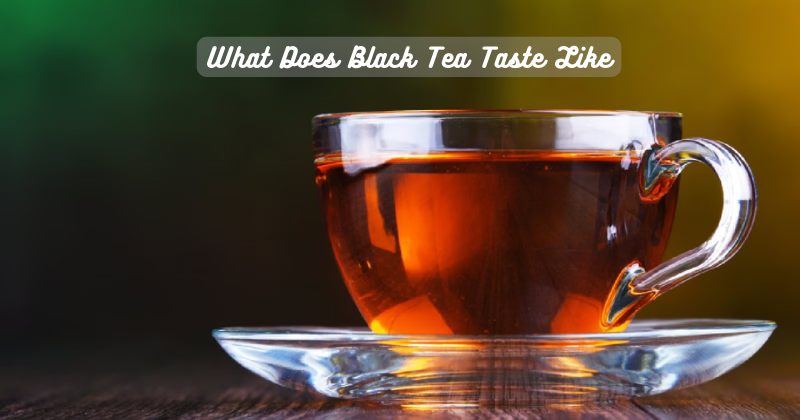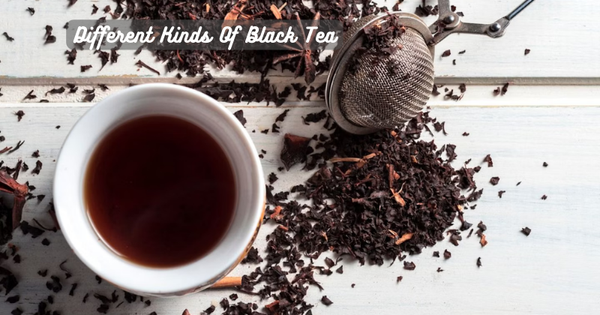Black tea is among the most popular teas worldwide and is known for its bold and full-bodied flavor. It is made from the Camellia sinensis plant, which undergoes a process of withering, rolling, oxidizing, and drying.
This results in the distinctive dark color and robust taste known for this tea.
Despite being all derived from the same plant, this tea has various flavors and aromas due to the different growing regions, harvesting methods, and processing techniques.
This means that no two cups of black tea are exactly alike, making it an exciting and versatile beverage to explore.
This article will delve into what gives this tea its unique taste profile and the factors that can affect its flavor.
We will also explore the different types of black tea and how they differ in taste, helping you better understand what to expect when trying out a new blend.
What is Black Tea?
This tea is fully oxidized, meaning the leaves have been exposed to oxygen for an extended period. This process causes the leaves to turn dark and gives black tea its distinctive flavor.
The oxidation process also changes the chemical composition of the tea leaves, resulting in a higher caffeine content than other teas, such as green or white tea. This makes black tea a popular choice for those looking for a boost.
Despite its name, black tea can range from dark red to golden depending on the intensity of oxidation and the quality of leaves used. However, no matter the shade, all black teas share similar flavor characteristics that make them stand out.
About black teas
This tea is one of many varieties of tea produced from cultivated camelia. Almost all teas from these plants include black tea, white tea, oolong tea, and green tea.
The main thing distinguishing Black tea from other tea varieties is its processing technique.
Black tea is fully oxidized, meaning its leaf has exposed oxygen and is dry and darkened. This tea is generally very high in caffeine and about half of what's in coffee.
What Does Black Tea Taste Like?
So, what does black tea taste like? The answer to this question can vary depending on personal preferences and the type of dark tea consumed.
However, some familiar flavor profiles often associated with black tea include:
- Bold: Black tea is known for its robust flavor, making it a popular choice for those who prefer a more intense taste.
- Malty: Some black teas have a malty taste, similar to the flavor of bread or grains. This is especially prominent in Assam black tea.
- Smoky: Due to their unique drying process, teas from China, such as Lapsang Souchong, can have a smoked or woody flavor.
- Earthy: Some teas have an earthy and slightly vegetal taste, similar to green tea. This is especially true for teas grown in Yunnan, China.
- Sweet: Despite its bold flavor, this tea can also have a natural sweetness, making it an excellent base for flavored teas or enjoyed on its own.
- Full-bodied: Black tea is known for its rich and full-bodied flavor, often described as "mouth-filling" due to its distinct texture.
By exploring different types of tea, you can discover a wide range of flavors and aromas, making it an exciting and versatile beverage.
Some factors that can affect the taste of black tea include
- Growing Region: The environment in which the tea is grown can significantly impact its flavor. Factors such as soil, climate, and altitude can all contribute to the taste of black tea.
- Harvesting Method: How the leaves are harvested can also affect their taste. Hand-picking is often considered the best method for ensuring quality leaves that will result in a flavorful tea.
- Processing Technique: As mentioned earlier, the processing technique used for this tea can significantly influence its taste. Different oxidation levels and drying methods can give black teas unique flavors.
- Age: The tea leaves aged over time can develop more profound and complex flavors, similar to how wine improves with age.
- Brewing Method: How you brew your dark tea can also impact its taste. Factors such as water temperature, steeping time, and the amount of tea leaves used can all affect the final flavor.
By paying attention to these factors, you can better understand why each cup of tea may have a different taste profile and how to adjust your brewing technique to achieve your desired flavor.
Types of Black Tea
There are several types of black tea, each with its unique taste and aroma. Some popular varieties include:
- Assam Black Tea: This bold and malty black tea comes from the Assam region in Northeast India. It is often used as a base for breakfast teas such as English or Irish Breakfast tea.
- Darjeeling: Grown in the foothills of the Himalayas, Darjeeling black tea has a delicate and floral taste with hints of muscatel grape.
- Ceylon: This tea hails from Sri Lanka and is known for its smooth and slightly citrusy flavor.
- Keemun: Considered one of China's finest black teas, Keemun has a sweet and fruity taste with hints of chocolate.
- Earl Grey: This popular flavored black tea is infused with bergamot oil, giving it a distinct citrusy aroma and rich flavor.
By trying out different types of black tea, you can discover your personal favorite and appreciate the unique characteristics that make each blend stand out.
Benefits of Drinking the Black Tea
There are many benefits to drinking this tea beyond its delicious, strong taste. Some potential health benefits of black tea include:
First and foremost, this tea is an excellent source of antioxidants, which can help protect your body against cell damage. Also, its caffeine content can provide a natural energy boost and improve mental alertness.
Research has also shown that black tea may help reduce the risk of heart disease and lower cholesterol levels. It may also have anti-inflammatory properties and aid in digestion.
However, as with any beverage, it's essential to consume black tea in moderation and be mindful of added sugars or other ingredients that can affect its health benefits.
Additionally, many people find drinking this tea calming and soothing, making it the perfect beverage to enjoy during a busy day or while winding down in the evening.
Tips for Enjoying Black Tea
Here are a few tips for getting the most out of your black tea experience:
- Experiment with brewing methods: How you brew your black tea can significantly impact its taste. Try out different techniques and see which one suits your preferences.
- Pair it with food: Black tea's bold and complex flavors make it an excellent pairing for various foods, from savory dishes to sweet desserts.
- Try different types: Don't just stick with one kind of black tea. Explore and discover new blends to expand your palate.
- Use quality tea leaves: To truly appreciate the taste of black tea, it's essential to use high-quality tea leaves. Look for loose-leaf teas or whole-leaf bags instead of tea dust or fannings.
- Enjoy it in good company: Black tea is often a social beverage, so why not share a cup with friends or family and make it an enjoyable experience?
By following these tips, you can enhance your black tea journey and discover all the fantastic flavors and benefits this beloved drink offers.
FAQs
Can I add milk and sugar to black tea?
Yes, you can. Adding milk and sugar is a common way to enjoy black tea, especially in Western cultures.
Do black teas contain caffeine?
Yes, black teas do contain caffeine. A typical cup of black tea can have anywhere from 40-120 mg, depending on the strength and brewing method.
Can I drink black tea if I have a caffeine sensitivity?
If you are sensitive to caffeine, it's best to consult your doctor before consuming black tea. You may also want to try decaffeinated versions or limit your intake.
How should I store my black tea?
Store your black tea in an airtight container in a cool, dry place away from direct sunlight to maintain its freshness and flavor. Avoid storing it near strong-smelling items, as tea can absorb odors.
What is the difference between the taste of black and green tea leaves?
Tea leaves are harvested simultaneously and dried in both situations, but methods differ. Black teas can be kept outdoors for longer to undergo natural oxidation. Exposure to oxygen can make tea leaves blacken.
Oxide influences leaf color, infusion color, and taste. Black teas are generally less sour and more fruity than green teas.
White teas are lighter and less oxidized. It has soft, velvety textures that are less strong than most teas.
What is Ceylon black tea?
Ceylon Tea is mainly produced in Sri Lankan villages in three regions: Upcountry, Midcountry, or Downcountry.
The height of an elevation can influence both the quality and the taste of tea.
The high-elevation region provides the ideal conditions for growing tea with cool days and abundant rainfall. Upcountry tea has a mild color and flavor.
The Midcountry Ceylon has a more full and intense scent and strong aromas. Low-country tea remains very strong and rich, but usually, its leaf is less pronounced.
What are flavored Flavored black teas?
In Western countries, flavored tea is extremely common. A typical blend constructed from Assam or Ceylon is formulated by combining ingredients with unique flavors.
Black tea is most commonly a component of Chai tea. Cinnamon, ginger, cardamom, oranges, cloves, and apples have a taste for the tea.
Masala Chai is produced with strong black tea from Ceylon and spiced with spices like cinnamon, cardamom, and cinnamon.
Black tea also mixes very easily with fruit, like Ginger Peach tea with ginger root peach flavor and marigold flower.
Conclusion
Black tea is a beloved beverage worldwide, known for its rich and diverse flavors.
By understanding the factors contributing to its taste, trying out different varieties, and enjoying it in moderation, you can fully appreciate the complex and enjoyable experience of drinking black tea. Cheers!
So, next time you brew a cup of black tea, take a moment to savor its unique taste and reflect on all the factors that went into creating such a delicious and beloved beverage.
Black tea is a remarkable drink worth exploring with its rich history, diverse flavors, and potential health benefits. Cheers to your next cup of flavorful black tea!


